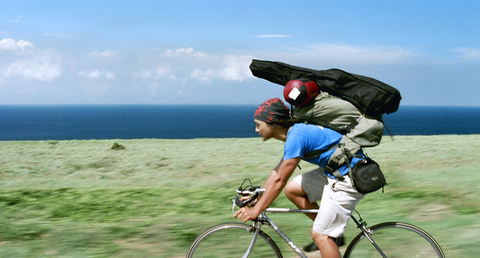A child of Taiwan's New Wave cinema, award-winning cinematographer En Chen (陳懷恩) has been a long-term collaborator of Hou Hsiao-hsien (侯孝賢) and has worked with acclaimed directors such as Chang Tso-chi (張作驥) and Cheng Wen-tang (鄭文堂) since the 1980s.
After more than 20 years of working at the center of Taiwan's film industry, the veteran cinematographer has decided to tell a story of his own with a scanty government subsidy and lots of supports from friends and money of his own. The end result is his feature debut Island Etude (練習曲), a road movie about Taiwan's past and present, it's beauty and sorrow and the stories of its inhabitants.
With guest appearances by novelist, playwright and filmmaker Wu Nien-jen (吳念真), theater veterans Deng An-ning (鄧安寧) and Yang Li-ying (楊麗音), TV personality Hsu Hsiao-shun (許效舜), musician Kimbo Hu (胡德夫) and others, the film is centered on a hearing-impaired college student named Ming-hsiang and the people and their stories he encounters during his seven-day, round-the-island bike trip. He travels through the scenic seaside landscape in Hulien (花蓮) and along the western coastal highway, passes through the Matsu pilgrimage (媽祖遶境) and a protest by elderly female workers protesting the unannounced closure of the factory in which they had worked for lifetime. The film takes audiences deep into the corners of the country and presents intimate portraits of people from different cultural, social and ethnic backgrounds, all of whom have their own stories to tell.

PHOTO: COURTESY OF CHI FEI FILM
As the writer, cinematographer and director, Chen makes a genuine effort to share his affection for the island and its people. The narrative is carried through Ming-hsiang's travels through different places, with the natural environment playing an important role and give the piece an unique rhythm and texture. In tune with the New Wave look and spirit, the travelogue ingenuously mixes history, myth, folk memories and contemporary issues of the country and its people.
Though some sections of the film seem over-produced and some less than articulate and rather dull, director Chen pulls off a human story about this diverse country. As the real-life round-the-island biker who inspired Chen to make the film said: "there is something that if you don't do it now, you will never do it for the rest of your life." Chen has certainly grasped the chance to realize his dream and has done a commendable job.

PHOTO: COURTESY OF CHI FEI FILM

Exceptions to the rule are sometimes revealing. For a brief few years, there was an emerging ideological split between the Democratic Progressive Party (DPP) and Chinese Nationalist Party (KMT) that appeared to be pushing the DPP in a direction that would be considered more liberal, and the KMT more conservative. In the previous column, “The KMT-DPP’s bureaucrat-led developmental state” (Dec. 11, page 12), we examined how Taiwan’s democratic system developed, and how both the two main parties largely accepted a similar consensus on how Taiwan should be run domestically and did not split along the left-right lines more familiar in

This month the government ordered a one-year block of Xiaohongshu (小紅書) or Rednote, a Chinese social media platform with more than 3 million users in Taiwan. The government pointed to widespread fraud activity on the platform, along with cybersecurity failures. Officials said that they had reached out to the company and asked it to change. However, they received no response. The pro-China parties, the Chinese Nationalist Party (KMT) and Taiwan People’s Party (TPP), immediately swung into action, denouncing the ban as an attack on free speech. This “free speech” claim was then echoed by the People’s Republic of China (PRC),

As I finally slid into the warm embrace of the hot, clifftop pool, it was a serene moment of reflection. The sound of the river reflected off the cave walls, the white of our camping lights reflected off the dark, shimmering surface of the water, and I reflected on how fortunate I was to be here. After all, the beautiful walk through narrow canyons that had brought us here had been inaccessible for five years — and will be again soon. The day had started at the Huisun Forest Area (惠蓀林場), at the end of Nantou County Route 80, north and east

Specialty sandwiches loaded with the contents of an entire charcuterie board, overflowing with sauces, creams and all manner of creative add-ons, is perhaps one of the biggest global food trends of this year. From London to New York, lines form down the block for mortadella, burrata, pistachio and more stuffed between slices of fresh sourdough, rye or focaccia. To try the trend in Taipei, Munchies Mafia is for sure the spot — could this be the best sandwich in town? Carlos from Spain and Sergio from Mexico opened this spot just seven months ago. The two met working in the